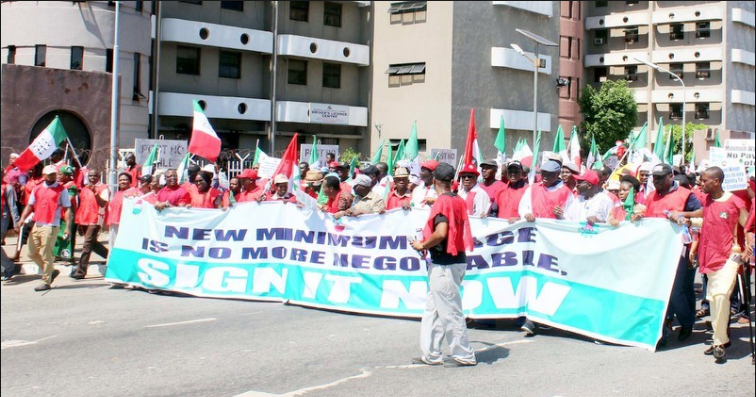WRITTEN BY COMR. GODWIN IBEKWE
It is gratifying to note that the bill for the new minimum wage, sent to the National Assembly by the federal government, has passed second reading in the Senate.
The new minimum wage had raged a big dust in the greater part of 2018 and has become even more so in 2019.
The Nigerian Labour Congress, under its leadership, Comrade Ayuba Wabba, has taken this as one of its major projects in consistently engaging government on the urgent need to approve a new minimum wage in Nigeria.
The congress has been consistent in arguing that the current N18, 000 came into effect in 2011 under the Goodluck Jonathan administration and so should be reviewed.
On the face value, virtually every stakeholder in the Nigerian project agrees on the need for a revision of the current N18, 000 minimum wage which, as a “take home pay”, cannot really take the Nigerian workers home.
Even President Muhammadu Buhari acknowledged this fact when he said, at a federal executive council meeting, that a review was necessary, despite the fiscal challenges. Thus, he constituted the Tripartite Committee of Government, Organized Private Sector and Labour, which considered the National Minimum Wage and made recommendations for its upward review.
Indeed, in comparison with other jurisdictions in Africa, the minimum wage in Nigeria is less than in comparator countries of South Africa and even Ghana, among others. Hence, conceptually and morally, the review of the minimum wage appears to have some merit.
One major reason to justify this new minimum wage is that, particularly, the level of inflation in Nigeria has been on the upward trend since June 2015 when it was single digit. It increased to as
high as 18% in January 2017 after which it trended downwards to about 11% at the end of the third quarter of 2018. Curiously, the National Bureau of Statistics (NBS) says inflation is currently trending upwards.
Hence, in real terms, after accounting for inflation, the economic circumstances of the average Nigeria worker, even for those earning above the minimum wage, have been deteriorating.
Again, the value of the naira has continued to nose dive. For instance, the naira exchanged for about one hundred and sixty naira to a dollar in 2011 when N18, 000 was introduced. Today, the naira exchanges for about three hundred and seventy to a dollar. Given this scenario, there is need for the new minimum wage to enhance the living standards of Nigerian workers.
More so, it would be recalled that some state governments had openly stated that whilst they are still battling with paying staff salaries at the current minimum wage of N18, 000, they would find it difficult to pay the newly proposed N30, 000 minimum wage and had thus settled for a lower amount. That is a worrisome issue that could surface at the level of implementation, particularly at the state level.
Another issue that may need to be incorporated into the overall arrangement, now or later, is the need to address minimum wage issues within the context of federalism. In a federation, minimum wage benchmarks are necessary as a means of guaranteeing some minimum living standards across the country.
However, when the component parts of the federation are differently endowed, each component part should be allowed to function at its own level of financial capacity. The acceptance of a minimum wage of, say, N30, 000 should not stop well-off states like Lagos, Akwa Ibom or Rivers, for example, from operating at a higher level.
They may need to pay more, given their relatively better financial standing, than the rest.
The other very critical issue is whether the Nigerian workers would actually be well-off, in real terms when the new N30, 000 minimum wage comes into effect. Experience from past minimum wage increases has indicated that the action is usually inflationary.
The increased wage would likely trigger series of price increases in transportation, food items, accommodation and other goods and services, that in real terms, the Nigerian worker may become worse off. Hence, before the bill is passed and signed into law, there is the need to use series of policy instruments to mitigate the negative effects of the increase. This is very crucial.
It is hoped that the authorities will work out a practical actionable arrangement that will lead to the enhancement of the living standards of Nigerian workers, who have suffered for too long in this country.





Comments are closed for this post.